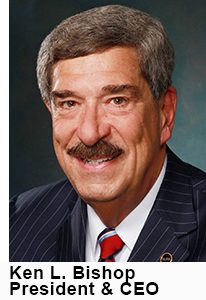SHARE:

 At the 2019 NASBA Regional Meetings, Chair Janice Gray and I spoke about the importance of ethics and, specifically, the importance of NASBA’s ethics arm, the Center for the Public Trust (CPT). Ethics is the cornerstone of the U.S. CPA profession, so it is appropriate that NASBA invests in the recognition of ethics and provides ethics training and certification to students, business professionals and Certified Public Accountants. CPT has also recognized leaders in the profession, business and industry who have exhibited strong ethical behavior. Regrettably, this Memo is not about that, but about the occasional failures that tarnish the image of the profession. At the 2019 NASBA Regional Meetings, Chair Janice Gray and I spoke about the importance of ethics and, specifically, the importance of NASBA’s ethics arm, the Center for the Public Trust (CPT). Ethics is the cornerstone of the U.S. CPA profession, so it is appropriate that NASBA invests in the recognition of ethics and provides ethics training and certification to students, business professionals and Certified Public Accountants. CPT has also recognized leaders in the profession, business and industry who have exhibited strong ethical behavior. Regrettably, this Memo is not about that, but about the occasional failures that tarnish the image of the profession.
Nearly 20 years ago, after I retired from my first career in law enforcement and had just become the Executive Director of the Missouri State Board of Accountancy, I saw my first instance of disappointing behavior. For context, my duties as an Assistant Director of the Missouri Department of Public Safety included oversight of our law-enforcement academies and compliance, including professional education and training. In many ways, the rules and regulations for Continuing Professional Education (CPE) were similar to what I found when I began regulating CPAs.
While trying to learn the ropes of my new State Board position, I decided to visit a CPE course that was being delivered in St. Louis. As I was new to the job, no one had any idea who the guy standing at the back of the room was. While observing the sign-in process at a table set up in the back of the classroom, I watched a young lady approach the table and sign in. I noticed that she appeared to sign in multiple times, so when she sat down, I went over to the sign-in sheet and saw that she had signed several different names in slightly different handwriting. Being an old cop and somewhat suspicious by nature, I continued to observe.
At the end of what I thought was a very well-done course, I watched the same young lady dutifully sign out — five times. My curiosity was peaked, so I approached and asked her about the multiple sign-ins. After enduring the “who are you” and “what is the Board of Accountancy” questions, it became apparent that she knew things were not good. She explained that she was told to sign in for several partners. I asked her to please introduce me to them as I would like to see how they enjoyed the course. After a brief hesitation, she replied that the partners were not present. I began to understand that, just as with some experienced police officers, some experienced CPAs sometimes do bad things.
If you are curious as to how the matter ended, I had the young lady tell the less than diligent CPE table staff that she needed to remove the errant names. I then advised her to call her boss (one of the forged names and the managing partner of a sizeable firm) and tell him I would like to stop by and visit. She timidly replied that she was told that I would have to make an appointment. I responded, “Never mind: I will just have him to Jefferson City [Missouri’s capital].” Amazingly his calendar suddenly opened up and we had the opportunity to have a serious discussion. In cop terms, I ended up giving him and his fellow conspirators a “warning” based on their promise it would never happen again. I later got to know several of these gentlemen during my years at the Missouri Board and never saw another instance of misconduct, but I never forgot their troublesome, and frankly dumb, behavior.
At the Regional Meetings there was some discussion about a big firm being fined $50,000,000 because of cheating on CPE, or as one attendee remarked “about $20,000 per partner.” I heard a range of feedback, some of which was disappointing. One State Board member, with nexus to the impacted firm, made the comment, “It was only CPE.” I thought back to my reaction to hearing a similar excuse 20 years ago. It may “only” be CPE, but it is cheating, pure and simple, and it’s a culpable violation of law.
NASBA’s members, the U.S. State Boards of Accountancy, have a tremendous responsibility in protecting the public. Regrettably, most Board members will see multiple instances of failed ethical behavior of various degrees during their terms. CPE violations, although arguably less serious than cases of fraud and malpractice, may be indicative of more systemic problematic cultures that may exist. According to the SEC’s settled order in the recent case, the cheating activity was extensive. The SEC concluded: “A number of lead audit engagement partners not only sent exam answers to other partners, but also solicited answers from and sent answers to their subordinates.”
I often have the opportunity to speak to newly certified CPAs. In my recent remarks to such an audience in New Hampshire, I advised the students of the importance of ethics and the reality that in their careers they will see ethical failures, and they may be asked to join in with that behavior. My advice to them, “Don’t do it the first time as it is a slippery slope.” Imagine the impact on the careers of the subordinates of the firm being fed answers to CPE tests (ironically in ethics training mandated by the SEC) by senior partners who they may well consider to be mentors.
CPAs have a reputation for integrity and trust. By far, the majority of them do the right things, but we, and the State Boards, exist for a reason. Not only do we protect the public, but we also protect the important public trust in this great profession.
Semper ad meliora (Always toward better things).
— Ken L. Bishop
President & CEO
|


